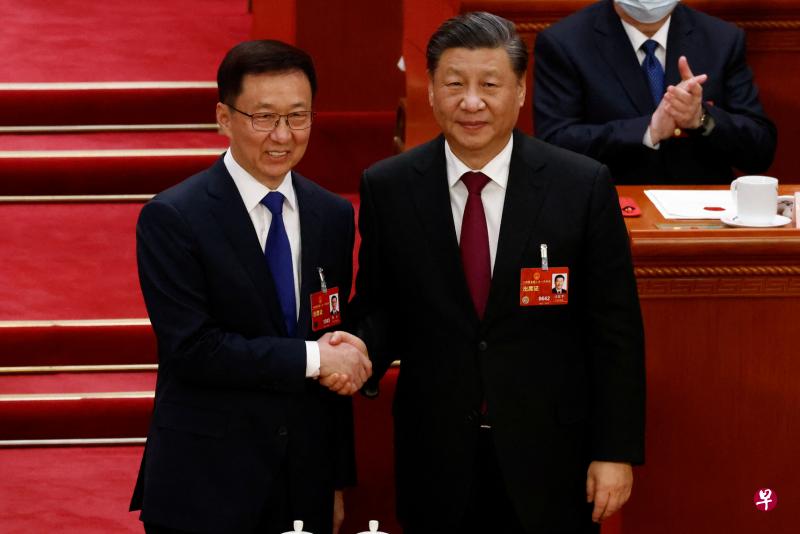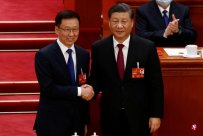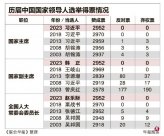
More than a dozen national institutional leaders who were elected in the same field were almost fully voted, highlighting the high degree of unity of the mainstream of Chinese politics in action.Scholars believe that the leadership of the Chinese official as the core has established a high degree of authority, and all members are expected to be elected.The re -election means that 70 -year -old Chinese officials have become the longest -term head of state since the founding of the Communist Party of China in 1949.
Chinese officials have been re -elected again after five years, and the third national chairman will be opened.
Almost all the more than a dozen national institutional leaders who were elected in the same field were almost fully voted, highlighting the high unity of the mainstream of Chinese politics in action.
China National People's Congress on Friday (March 10) for some new national institutions leaders.The Chinese officials received 2,952 in favor of the voting of the President of the State and the President of the National Central Military Commission, without opposition votes.Han Zheng, a member of the Standing Committee of the Political Bureau of the Communist Party of China, Han Zheng, former member of the Standing Committee and the former Vice Premier of the State Council, was elected as chairman of the Standing Committee of the National People's Congress and vice chairman of the Standing Committee of the National People's Congress.
At the two -year change of the two sessions (the National People's Congress and the annual meeting of the CPPCC) five years ago, Chinese officials were re -elected as the President of the State President and became the "Trinity" (, President of the State and the Chairman of the Central Military Commission) system in 1993. Since the implementationThe first national chairman was elected.The re -election means that 70 -year -old Chinese officials have become the longest -term head of state since the founding of the Communist Party of China in 1949.
After the conference announced the voting results of the President of the National President, nearly 3,000 representatives at the scene set up and reported applause in 56 seconds.The Chinese official on the podium stood up and bowed to thank, and shook hands with Li Qiang, Li Zhanshu, who was sitting on both sides of his sides, and Li Qiang, a member of the Politburo Standing Committee, to accept the congratulations on the two.
After being elected chairman of Zhao Leji, he first walked to the Chinese official to shake hands with him, and then shook hands with Li Zhanshu, who had just stepped down.After Han Zheng was elected as the vice chairman, he also went to Chinese official and former vice chairman Wang Qishan, and successively shook hands with the two.Wang Qishan then walked to the center of the porch and shook hands with Chinese officials a few seconds with a smile.
Han is the first vice -chairman of the country to be elected for many years.In contrast, when Wang Qishan was elected as the vice chairman five years ago, one was opposed.Twenty years ago, when the CCP veteran Zeng Qinghong was elected as the vice chairman, he also faced up to 177 opposition votes and 190 abandoned tickets.
Kou Jianwen, a special professor of the East Asia Research Institute of Taiwan Politburo, pointed out in the United Morning Post that he has experienced high -level personnel changes in the past few years, and the CCP has repeatedly emphasized that "adhere to the central government's centralized unified leadership", with the official Chinese official as the coreThe leadership team has established a high degree of authority, and all members are elected as expected.
Kou Jianwen said: "The national support situation at the voting site actually appeared five years ago. Today's election only transitions to the next five -year ceremony."
On the occasion of the third national chairman of China, the internal and external winds of China are increasing.Analysis generally believes that China's officials will focus on promoting the stable development of China's economy in the next five years and balance between the United States, including the risk of responding to the potential Taiwan Strait conflict.
Wang Huning was elected chairman of the National Committee of the Chinese People's Political Consultative Conference
Li Hongzhong, the vice chairman of the Standing Committee of the National People's Congress, is the only elected candidate in the audience. He received a total of 2950 votes in favor, one vote against and one vote abandonment.
Except for Li Hongzhong, the other 13 deputy chairmen were elected with full votes.
Li Hongzhong subsequently misunderstood the oath of the constitution.When he led other vice chairman and secretary general of the Standing Committee of the National People's Congress, he said "maintaining the authority of the constitution" as "maintaining the dignity of the constitution."
The voting session on Friday lasted nearly 40 minutes. Soon after the Chinese official completed the vote, it began to talk to Li Qiang on the left side.
Wang Huning, a member of the Politburo Sitting on the left side of Li Qiang, also joined the conversation shortly after. The three talked about 20 minutes.
Wang Huning was elected chairman of the National Committee of the Chinese People's Political Consultative Conference in the same afternoon. Li Qiang is expected to be appointed Prime Minister of the State Council on Saturday (March 11) and replaced Li Keqiang as the helm of the State Council of the Chinese State Council.
The National People's Congress will select another group of national institutions on Saturday, including the director of the National Supervision Commission, the director of the Supreme People's Court, and the Attorney General of the Supreme People's Procuratorate.



